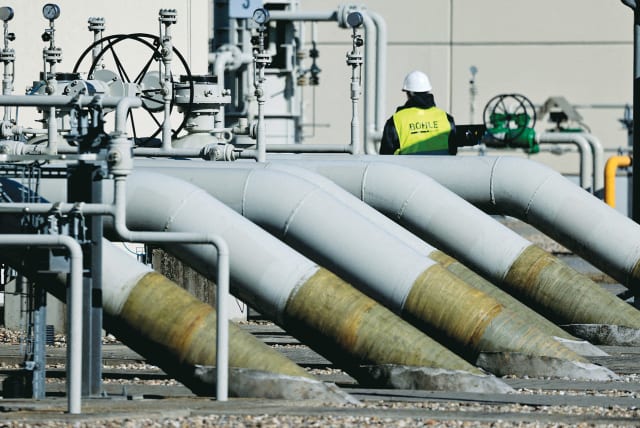Europe’s energy problem: Major challenges still lie ahead - opinion

Looking at the past, the continent’s gas policies have been the worst possible, relying excessively on one supplier, Russia.
Europe is the big loser from the Ukraine-Russian conflict, despite its current sense of “we have overcome the greatest risks and have survived the winter exceptionally well.”
Looking at the past, the continent’s gas policies have been the worst possible, relying excessively on one supplier, Russia.
Currently, the European Union countries are breathing a sigh of relief, leading to complacency. However, Europe had to pay sky-high gas prices in 2022, culminating in $85/MMBtu (NIS 310.34) in August 2022. Gas prices in Israel are a steady $4.5-$5.5/MMBtu (NIS 16.43-NIS 20.08).
High gas prices in Europe have forced some EU energy-intensive industries to close and it has required huge budgets from the richest countries as support packages to households. Less fortunate countries were unable to afford this luxury and looked on in anger while Brussels tried to enact joint policies (cut consumption by 15%, refuse to agree to pay in rubles), while inter-state solidarity was shelved and replaced by each country for itself.
Current gas/liquid natural gas (LNG) prices are comfortable at $9-$12/MMBtu (NIS 32.86-NIS 43.81), but this was achieved by luck: mild weather and low Chinese consumption.
For the near future, some industrial demand destruction will be permanent, hurting the European economy, although European industry on the whole proved relatively robust and energy-intensive industries were already facing an uncertain future amid Europe’s energy transition.
Speakers at the FLAME, the main European gas event of the year, warned that luck is not a policy and that buyers cannot afford to let their guard down. Gas prices will remain volatile for years and could spiral if Europe suffers a severe winter and if gas consumption rises in China.
Japanese gas demand is also a relatively unknown factor as although consumption could fall, it could also remain flat as more semiconductor factories are constructed, which are high electricity guzzlers. Although Russia can cut gas supplies further to Europe, it has already cut 80%, and so an additional reduction will potentially hurt buyers less. Russia can only use gas as a weapon once.
Safe winter in Europe
THE FIRST real safe winter for Europe will be in 2027-28, when new LNG supplies will reach the global market from Qatar, the United States and hopefully, from the Eastern Mediterranean (pipeline or LNG).
Europe is also prioritizing energy efficiency, accelerating a shift to renewables for both climate and security of supply. However, Europe’s rush towards energy transition is potentially still ahead of its time with yet immature technology and risks repeating the same mistakes. It risks being as dependent on one supplier for basic renewable energy materials (China) as it was for gas (Russia). China is as likely to use this as a weapon in the future, as OPEC did with oil in the 1970s and Russia has done now with natural gas.
Nevertheless, control of renewable supplies will have less impact than that of oil and gas, as the effect is of slower deployment of technology, rather than the immediate cut-off of transportation fuel or shutting off the lights. This is because only the supply of the equipment can be controlled by China, not the energy source: wind and sun.
Europe is playing catch-up in terms of establishing much more LNG-import infrastructure. It has managed to capture existing floating regasification facilities (FSRU), which can help to bring gas to where it is needed. For more capacity, Europe is unlikely to be able to maintain momentum as newly built facilities will take years to complete.
In addition, without additional LNG coming into the global market, it could simply mean that countries will be competing among themselves for the same supplies, while each regasification facility will have to bear the burden of paying maintenance and tariffs, thus risking causing a hike in gas prices.
It is fundamental for Europe to establish pipeline links between countries so that land-locked countries can benefit from incoming LNG supplies, as well as those areas with as yet insufficient regasification capacity. In addition, they should not only rely on new LNG but also attempt to contract additional pipeline sources, such as Algeria, Libya, Cyprus and Israel.
Europe’s economy is in danger of becoming structurally less competitive due to the loss of cheap Russian gas and its reluctance to sign long-term gas contracts. Although Europeans talk the talk that by 2030 they will have ditched all Russian gas, it is less certain that they will be able to replace the entirety of pre-war Russian pipeline gas with more expensive and competitive LNG.
European commitment to previously signed long-term gas contracts with Russia’s Gazprom with take-or-pay clauses, and at least one force majeure international court case has ruled in favor of Russia, making long-term planning for Europe’s energy market even more difficult. All this makes for complex decision-making by Brussels.
For Israel, it means the need for decision-makers to understand the global market and take measures to help the Israeli gas industry compete on the global scene.
The writer is a natural gas analyst, consultant, lecturer and author.
Jerusalem Post Store
`; document.getElementById("linkPremium").innerHTML = cont; var divWithLink = document.getElementById("premium-link"); if (divWithLink !== null && divWithLink !== 'undefined') { divWithLink.style.border = "solid 1px #cb0f3e"; divWithLink.style.textAlign = "center"; divWithLink.style.marginBottom = "15px"; divWithLink.style.marginTop = "15px"; divWithLink.style.width = "100%"; divWithLink.style.backgroundColor = "#122952"; divWithLink.style.color = "#ffffff"; divWithLink.style.lineHeight = "1.5"; } } (function (v, i) { });

